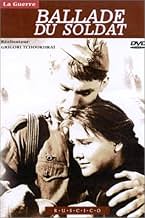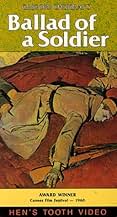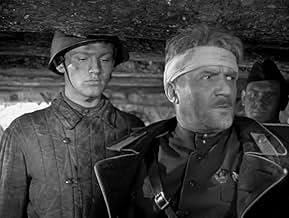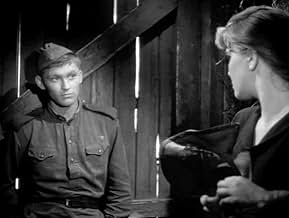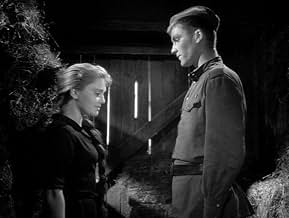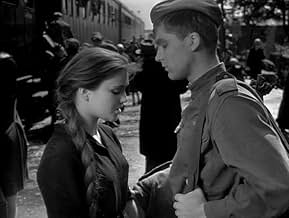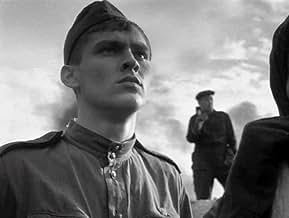IMDb RATING
8.2/10
12K
YOUR RATING
Young Russian soldier Alyosha earns a medal, but asks to visit his mother instead. His journey recounts various kinds of love during wartime.Young Russian soldier Alyosha earns a medal, but asks to visit his mother instead. His journey recounts various kinds of love during wartime.Young Russian soldier Alyosha earns a medal, but asks to visit his mother instead. His journey recounts various kinds of love during wartime.
- Director
- Writers
- Stars
- Nominated for 1 Oscar
- 6 wins & 4 nominations total
Vladimir Ivashov
- Alyosha Skvortsov
- (as Volodya Ivashov)
Mariya Kremneva
- Elizaveta Petrovna (Pavlov's Wife)
- (as M. Kremnnyova)
- Director
- Writers
- All cast & crew
- Production, box office & more at IMDbPro
Featured reviews
In the 1950s, 2 very critically acclaimed Russian films were made. The first film was "The cranes are flying" by Mikhail Kolotozov. It is true that it was a good film but it was more of a love story. If there is a film which all human beings must watch, it is "Ballad of a soldier" made by the great Russian cinéaste Grigori Chukrai. I still have vivid memories of this film, although I saw it in 1986 on India's only public television network called "Doordarshan". What I like the most about this film is that it has tremendous emotional power to move anyone regardless of that person's ideologies or beliefs. It talks of war without begging for kindness, mercy or pity. Such is the greatness of this masterpiece. In my opinion," Ballad of a soldier" is not only the greatest Russian film ever made, it is one of the greatest world cinema gems too. For those who have not yet seen it, one word of advice. Throw away all your Hollywood flicks and watch this humanist masterpiece. PS :10 out of 10 is a understatement. "Ballad of a soldier" would easily fetch 100 out of 10.
In World War Two, almost thirty million Russian soldiers and civilians were killed in the fight against fascism, a fact mainly ignored during the paranoia of the Cold War. In our attempt to demonize everything Russian, we also overlooked stories of individual heroism. In 1959, Russian director Grigory Chukhraj made a film attempting to describe "what happens when the world loses a single person" and it is a masterpiece. The beautiful and moving Ballad of a Soldier tells a personal story that illuminates how war can ravish both an individual and a country. The film is set in Russia in the midst of the war. Pvt. Alyosha Skvortsov (Vladimir Ivashov), a signaller, has earned a commendation by destroying two German tanks. Instead of accepting a medal, he requests to be granted a four-day leave to go home and visit his mother.
We learn early through the narration that this soldier did not survive the war so his journey home to visit his mother for one last time becomes all the more poignant. The film, however, is not about a destination but about a journey. The four-day trip encompasses a lifetime of experience. Before hiding out in a freight car, Alyosha encourages a soldier (Yevgeny Urbansky) who has lost his leg to go home to his wife. Along the way, he hitches a ride on a rain-soaked road with a woman deprived of sleep for 48 hours. He brings a present of soap to an unfaithful wife of another soldier but changes his mind and gives it to her father who longs for his son's return. He also meets Shura (Zhanna Prokhorenko), a radiant young woman who, like him, hides out in a freight car. Reluctant at first and fearful of Alyosha, the young couple experiences their first love in several sensitive scenes but it is to be short-lived.
Ballad of a Soldier, of course, aims to present Russian soldiers in the best possible light yet Chukhraj does not hesitate to show his characters as real human beings with flaws. A venal security guard is willing to grant the young soldier free passage in a freight car in exchange for cans of beef, and the wife of a soldier is unfaithful to her soldier husband, a sequence that landed the director in trouble with the Russian censors. In Alyosha, Chukhraj has created a good person: kind, loving, and noble but not larger than life, a soldier perhaps typical of millions of young men who gave their lives to protect their homeland. Their struggle and personal sacrifice has been immortalized in a great film.
We learn early through the narration that this soldier did not survive the war so his journey home to visit his mother for one last time becomes all the more poignant. The film, however, is not about a destination but about a journey. The four-day trip encompasses a lifetime of experience. Before hiding out in a freight car, Alyosha encourages a soldier (Yevgeny Urbansky) who has lost his leg to go home to his wife. Along the way, he hitches a ride on a rain-soaked road with a woman deprived of sleep for 48 hours. He brings a present of soap to an unfaithful wife of another soldier but changes his mind and gives it to her father who longs for his son's return. He also meets Shura (Zhanna Prokhorenko), a radiant young woman who, like him, hides out in a freight car. Reluctant at first and fearful of Alyosha, the young couple experiences their first love in several sensitive scenes but it is to be short-lived.
Ballad of a Soldier, of course, aims to present Russian soldiers in the best possible light yet Chukhraj does not hesitate to show his characters as real human beings with flaws. A venal security guard is willing to grant the young soldier free passage in a freight car in exchange for cans of beef, and the wife of a soldier is unfaithful to her soldier husband, a sequence that landed the director in trouble with the Russian censors. In Alyosha, Chukhraj has created a good person: kind, loving, and noble but not larger than life, a soldier perhaps typical of millions of young men who gave their lives to protect their homeland. Their struggle and personal sacrifice has been immortalized in a great film.
Comedians used to poke fun at Soviet movies during the Cold War era. The claim was that every Soviet film could be characterized by a single standard plot line—"Boy meets tractor, Boy falls in love with tractor, Boy marries tractor". Now, I'm not sure how accurate the wags were since Soviet films were never shown here, nor ours there. But, given Soviet emphasis on collective farming, and their theory that art should follow politics, that sort of result wouldn't be surprising.
Nonetheless, Soviet-made or not, this 1959 humanist gem shines like a proverbial pearl in the night. Sure, the boy and girl are idealized, but were there ever two more charming performers; they even look alike. Moreover, it's that natural glow amidst the seediest surroundings that suggests what some might call a triumph of the human spirit. After years of slickly contrived Hollywood pairings, I was captivated by a warmth and chemistry seemingly so unforced and unrehearsed that I marvel at how it was done. In my book, it's one of the great compelling love stories of the big screen.
Just as importantly, the movie is anti-war, but subtly so. We do see some devastation and combat, but the real indictment lies elsewhere. It rests with all the potentials cut short by unrelenting demands of the war machine. The boy must return to his unit or risk being shot as a deserter. Thus he must abandon the injured soldier with whom he could have been friends; he must risk losing the love of his life because trains must run on wartime; he must leave his mother, without even time to fix the leaky roof. But most of all, war demands that he, like so many fine young men, must leave life with a personal potential that will go tragically unrealized. As one of Chukrai's effects brilliantly illustrates, war is indeed a world turned upside down.
Also, there are the stunning visuals. Those vast Russian steppes may be flat and boring. Nonetheless, the corresponding big sky makes a magnificent backdrop for heroic low-angle shots of those dwelling amidst the vastness. Then there's that long dusty road at film's end, leading off into a great unknown that Alyosha must now travel. In contrast are the teeming crowds at the railway station, looking nothing like Hollywood in their simple cloth dresses and shirts. And what concern with fancy hair-do's can the women have when their hair is bound down with knotted kerchiefs. All in all, it's a revealing look at what could be called the Russian peasantry of the time.
No, the movie clearly doesn't come from the ministry of propaganda. Still, there are concessions. Note how cooperative strangers become no matter how initially cranky they are. The army officers especially are portrayed as understanding and non-threatening. Nobody is depicted negatively, except maybe the disloyal wife. Not even the Nazi enemy responsible for 20 million Russian dead is mentioned, let alone, vilified. No, the real antagonist here is war itself; the point is not stated, but it is shown to an uncommonly moving degree. The dedication at film's end may be to the Russian soldier, but the subtext throughout aims at the universal, regardless of time, place, or nationality.
Thus 50 years later, the movie remains a timeless humanist classic. And with it, I think Chukrai deserves a place alongside the early masters of Soviet film, that is, before the Stalinist tyranny descended. Now, I have nothing against tractors. In fact, I wish Hollywood would feature more such life-affirming inventions than the exploding cars they so love and worship. Nonetheless, I guess I'm glad that here, there's not a single tractor in sight.
Nonetheless, Soviet-made or not, this 1959 humanist gem shines like a proverbial pearl in the night. Sure, the boy and girl are idealized, but were there ever two more charming performers; they even look alike. Moreover, it's that natural glow amidst the seediest surroundings that suggests what some might call a triumph of the human spirit. After years of slickly contrived Hollywood pairings, I was captivated by a warmth and chemistry seemingly so unforced and unrehearsed that I marvel at how it was done. In my book, it's one of the great compelling love stories of the big screen.
Just as importantly, the movie is anti-war, but subtly so. We do see some devastation and combat, but the real indictment lies elsewhere. It rests with all the potentials cut short by unrelenting demands of the war machine. The boy must return to his unit or risk being shot as a deserter. Thus he must abandon the injured soldier with whom he could have been friends; he must risk losing the love of his life because trains must run on wartime; he must leave his mother, without even time to fix the leaky roof. But most of all, war demands that he, like so many fine young men, must leave life with a personal potential that will go tragically unrealized. As one of Chukrai's effects brilliantly illustrates, war is indeed a world turned upside down.
Also, there are the stunning visuals. Those vast Russian steppes may be flat and boring. Nonetheless, the corresponding big sky makes a magnificent backdrop for heroic low-angle shots of those dwelling amidst the vastness. Then there's that long dusty road at film's end, leading off into a great unknown that Alyosha must now travel. In contrast are the teeming crowds at the railway station, looking nothing like Hollywood in their simple cloth dresses and shirts. And what concern with fancy hair-do's can the women have when their hair is bound down with knotted kerchiefs. All in all, it's a revealing look at what could be called the Russian peasantry of the time.
No, the movie clearly doesn't come from the ministry of propaganda. Still, there are concessions. Note how cooperative strangers become no matter how initially cranky they are. The army officers especially are portrayed as understanding and non-threatening. Nobody is depicted negatively, except maybe the disloyal wife. Not even the Nazi enemy responsible for 20 million Russian dead is mentioned, let alone, vilified. No, the real antagonist here is war itself; the point is not stated, but it is shown to an uncommonly moving degree. The dedication at film's end may be to the Russian soldier, but the subtext throughout aims at the universal, regardless of time, place, or nationality.
Thus 50 years later, the movie remains a timeless humanist classic. And with it, I think Chukrai deserves a place alongside the early masters of Soviet film, that is, before the Stalinist tyranny descended. Now, I have nothing against tractors. In fact, I wish Hollywood would feature more such life-affirming inventions than the exploding cars they so love and worship. Nonetheless, I guess I'm glad that here, there's not a single tractor in sight.
10Rueiro
This is one of the greatest anti-war movies ever made and a touching little human drama that has not lost any of its power after half a century. After fifteen years since I first saw it, it remains among my ten favourite movies of all time from any country. It is full of poetry and visual beauty; a humble masterpiece from a young director at that time, who encountered all sorts of problems and restrictions during the shooting. Nevertheless, his perseverance to bring this work to life and the touchingly realistic performances of the cast make of this movie not only one of the best films that ever came out of the Soviet Union but also a classic gem of world cinema.
Many Americans suffered enormously on account of WWII. My own grandmother, who not only survived the Great Depression but also World War I while it was being fought right in her own Polish town, once said that the most difficult event in her life was sending two of her sons off to battle in the faraway Pacific theater. One of them ended up in heavy combat on Okinawa, and the other one served as a bombardier.
As hard as World War II was for so many Americans, including my grandmother and my uncles, I believe that it was even more difficult for the Russians as a people. The terror of war came to their very doorsteps, civilians and warriors alike, and it was inescapable for them. Regardless of any specific political situation or attempt at propaganda by either side, I think that this historical fact must be objectively recognized and respected.
A "ballad" is a form of poetry, and, for me, "Ballad of a Soldier" is where poetry meets the camera. At the very beginning, the mother of the young, hero soldier who is the central character of the film looks out at the one unpaved road that leads in and out of her village. Somewhere at the end of the road, where ever that may be, is her beloved son. Overhead is an unforgiving sky, representing a sense of the power that controls all.
On the battlefield, we are terrified by a tank that is determined to chase our hero soldier through the countryside until he somehow manages to secure a position in order to destroy it and one other. Recognized by his superiors for his heroism, instead of a medal he requests a furlough pass to say farewell properly to his mother and to fix her leaking roof. It is granted for only a few days. Under the time pressure, the viewer witnesses his long, harrowing journey home from the front, experiencing the chaos, displacement, and hardship of the war on civilians and soldiers alike. In the mayhem and the confusion, he also manages to find true love at a most unexpected time and place.
I am sorry that this film was unavailable to me as a ten year old child in 1959 when it was produced. Aside from the political climate that prevailed at the time, which was mostly filled with fear, perhaps I would have been old enough to judge that Russian people were of the same flesh and blood that I was and that their lives, not only as Russians but as human beings, were affected very seriously by the horrors of war. While it would have been a very important lesson for me at the time, it did not come too late for me 57 long years later. This is a beautiful movie. See it!
As hard as World War II was for so many Americans, including my grandmother and my uncles, I believe that it was even more difficult for the Russians as a people. The terror of war came to their very doorsteps, civilians and warriors alike, and it was inescapable for them. Regardless of any specific political situation or attempt at propaganda by either side, I think that this historical fact must be objectively recognized and respected.
A "ballad" is a form of poetry, and, for me, "Ballad of a Soldier" is where poetry meets the camera. At the very beginning, the mother of the young, hero soldier who is the central character of the film looks out at the one unpaved road that leads in and out of her village. Somewhere at the end of the road, where ever that may be, is her beloved son. Overhead is an unforgiving sky, representing a sense of the power that controls all.
On the battlefield, we are terrified by a tank that is determined to chase our hero soldier through the countryside until he somehow manages to secure a position in order to destroy it and one other. Recognized by his superiors for his heroism, instead of a medal he requests a furlough pass to say farewell properly to his mother and to fix her leaking roof. It is granted for only a few days. Under the time pressure, the viewer witnesses his long, harrowing journey home from the front, experiencing the chaos, displacement, and hardship of the war on civilians and soldiers alike. In the mayhem and the confusion, he also manages to find true love at a most unexpected time and place.
I am sorry that this film was unavailable to me as a ten year old child in 1959 when it was produced. Aside from the political climate that prevailed at the time, which was mostly filled with fear, perhaps I would have been old enough to judge that Russian people were of the same flesh and blood that I was and that their lives, not only as Russians but as human beings, were affected very seriously by the horrors of war. While it would have been a very important lesson for me at the time, it did not come too late for me 57 long years later. This is a beautiful movie. See it!
Did you know
- TriviaThe can of meat the train guard is eating from was clearly marked: "U.S. Meat". This would have been correct in actual life due the United States' Lend Lease with the Soviet Union.
- GoofsThe movie is set in July 1942 (a news report over loudspeakers mentions a Soviet retreat from Rostov and Voronezh). Yet the film depicts German Tiger and Soviet T 34/85 tanks, which came into service, respectively, in mid 1943 and early 1944.
- Quotes
Alyosha Skvortsov: Comrade General, instead of my decoration, could I go home to see my mother?
- ConnectionsFeatured in Fejezetek a film történetéböl: A szovjet film 1953-1970 (1990)
- How long is Ballad of a Soldier?Powered by Alexa
Details
- Release date
- Country of origin
- Languages
- Also known as
- Balada o vojniku
- Filming locations
- Mosfilm Studios, Moscow, Russia(Studio)
- Production company
- See more company credits at IMDbPro
- Runtime1 hour 28 minutes
- Color
- Sound mix
- Aspect ratio
- 1.37 : 1
Contribute to this page
Suggest an edit or add missing content


